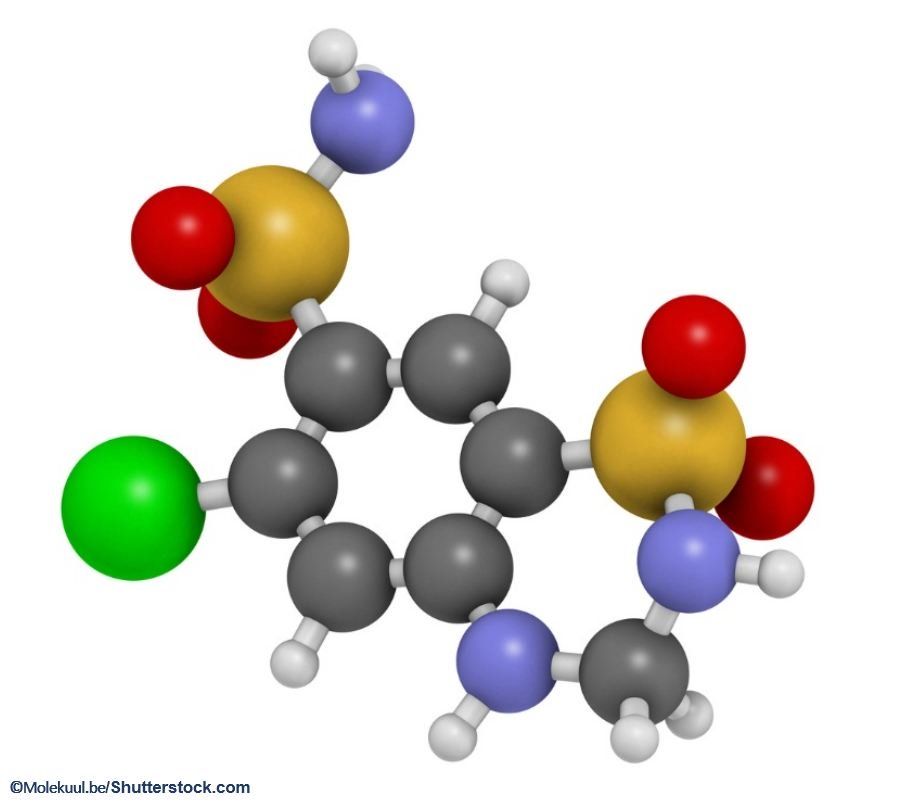Article
Chlorthalidone: Under-appreciated, Under-utilized, Undervalued
Chlorthalidone is one of the "Rodney Dangerfield" diuretics in the treatment of hypertension. That needs to change.

HCTZ moleculeWhat is the most commonly prescribed antihypertensive agent in the United States? If you immediately thought “Hydrochlorothiazide (HCTZ),” you’re right. It is the most commonly prescribed, at a dose of 12.5 mg a day. That translates into 50 million prescriptions for HCTZ worldwide annually.1 And that’s a lot of HCTZ. More important, though – how effective an antihypertensive agent is HCTZ at a 12.5 mg. daily dose?
A 2016 study in JACC compared chlorthalidone at low dose (6.25 mg) with HCTZ at 12.5 mg a day.2 Blood pressures on follow-up were obtained by 24-hour ambulatory monitoring and during office visits. It was a 12-week, comparative, double blind design trial. Although chlorthalidone and HCTZ (short-acting and extended-release HCTZ were used in an equal number of patients randomized to HCTZ) both lowered blood pressures taken in the office at weeks 4 and 12, significant ambulatory blood pressure lowering at weeks 4 and 12 was only observed with chlorthalidone 6.25 mg. Chlorthalidone also lowered nighttime systolic pressures, while HCTZ did not. The authors’ conclusion was, “Low-dose HCTZ monotherapy is not an appropriate antihypertensive drug.”2
So, what exactly is the history of chlorthalidone as an established antihypertensive agent?
Between 1985 and 1990, a trial called Systolic Hypertension in the Elderly Program (SHEP) was performed.3 Chlorthalidone was the primary active antihypertensive drug in the study. After 22-year follow up of the original cohort, the gain in life expectancy in the chlorthalidone group was 1 day more of life on average for every month chlorthalidone was taken to treat hypertension.3 And this was not a young cohort – patients randomized were > 60 years of age at the outset of the study. Remarkable benefits in an older hypertensive demographic accrued from using chlorthalidone.
In another major hypertension trial, ALLHAT (the Antihypertensive and Lipid-Lowering Treatment to Prevent Heart Attack Trial, 2002), chlorthalidone was more effective than lisinopril for reducing cardiovascular events and more effective than amlodipine in preventing congestive heart failure.1 Although most comparisons pit chlorthalidone against HCTZ, chlorthalidone has surpassed in benefits commonly prescribed antihypertensives in other classes as well.1
Chlorthalidone, a thiazide-like agent that is not a thiazide, has evidence-based data for reducing morbidity and mortality when prescribed to treat hypertension.4 But many years after SHEP, ALLHAT, and other studies, HCTZ is still prescribed more than it should be especially given no evidence for the drug’s ability to reduce morbidity and mortality.1The British agency National Institute for Health and Excellence (NICE), has suggested that indapamide or chlorthalidone should be the first choice antihypertensive diuretics.5 There will be more on indapamide in a later commentary.
Chlorthalidone (and indapamide) have become the “Rodney Dangerfields” of diuretics for antihypertensive therapy. This undervaluation should stop. If 50 million prescriptions for 12.5 mg HCTZ are written worldwide annually, just think of how many have ever been prescribed-most likely without therapeutic effect even when used in combination with other antihypertensives. Remember, a dose of chlorthalidone considered to be subtherapeutic (6.25 mg) was superior to the standard dose of HCTZ.
If it is both blood pressure control and evidence for morbidity and mortality benefits we are looking for in hypertension treatment, chlorthalidone’s time has come, and HCTZ’s time should go.
References
1. Roush GC, Sica DA. Diuretics for hypertension: a review and update. Am. J Hypertens.2016; 29:11301-137.
2. Pareek AK, Messerli FH, Chandurkar NB, et al. Efficacy of low-dose chlorthalidone and hydrochlorothiazide as assessed by ambulatory blood pressure monitoring. J Am Coll Cardiol. 2016;67:37
3. Roush GC, Ernst ME, Kostis JB, et al. Not just chlorthalidone: evidence-based, single tablet, diuretic alternatives to hydrochlorthiazide for hypertension. Curr Hypertens Rep. 2015; 17:540.
4. DiNicolantonio JJ, Bhutani J, Lavie CJ, O’Keefe JH. Evidence-based diuretics: focus on chlorthalidone and indapamide. Future Cardiol. 2015; 11:203-217.
5. Kostis JB, Cabrera J, Cheng JQ, et al. Association between chlorthalidone treatment of systolic hypertension and long-term survival. JAMA 2011;306:2588-2593.




